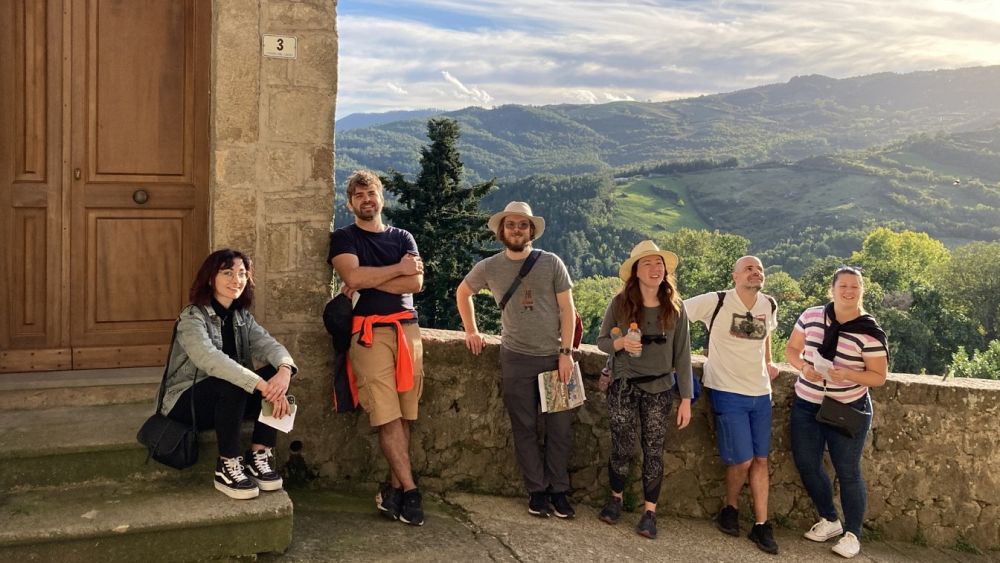Santa Fiora is an amazing ancient ‘borgo’ in Maremma, south of Tuscany.
Surrounded by woods on the Monte Amiata lava dome, the Italian village dates back over 1,000 years.
But it wasn’t Santa Fiora’s natural beauty that first drew us in.
After launching KINO - a start-up that brings digital nomad communities to Italy’s undiscovered gems - with a trip to Tursi in June 2022, our next destination had to live up to the hype.
Having heard about Santa Fiora’s drive to become remote worker friendly, we earmarked it as a strong contender.
After several visits over the course of two years, we were convinced it was the perfect destination for our second remote work adventure.
Why did we choose Santa Fiora for our digital nomad retreat?
Though remote, Santa Fiora is a desirable location for digital nomads for several reasons.
Its heritage, quaint architecture and high quality of life have earned it a place among ‘I Borghi più belli d'Italia’ - an association of the most beautiful villages in Italy.
It’s also among a handful of Italian mountain towns embracing the remote work revolution.
In its bid to become a ‘smart working village’ the community of less than 3,000 has invested in high-speed fibre optic broadband and a co-working space.
It also offers incentives for people who wish to stay on a short term basis: those who rent a house for two to six months can apply for up to 50 per cent of their rent to be covered by a local fund.
All these points combined created an amazing framework for our second digital nomad venture.
When is the best time to visit Santa Fiora?
The Maremma region has mild winters and cool summers compared to other parts of Italy, making it a great place to visit year round, but especially between April to October when rainfall is minimal and temperatures warm.
Our trip was to take place at the tail end of that window - a possible risk, considering Santa Fiora is 687 metres above sea level.
Nevertheless, 11 people from nine different countries - Bulgaria, Germany, Hungary, Italy, Slovakia, South Africa, the UK and the USA - decided to take the plunge with us.
Luckily, we were not disappointed. Santa Fiora’s rolling countryside, medieval architecture and colour-morphing chestnut trees made a bold impression - and set the scene for a weekly roster of seasonal events, from the chestnut festival of Arcidosso to Amiata mushroom festival.
The weather was better than expected. October was sunny and warm, the foliage just stunning. This gave us the chance to fully enjoy the hot springs in Saturnia and Siena, and a local vineyard in Pitigliano where the owners educated us about the wine making process.
What are the challenges of remote working in Santa Fiora?
Setting up a remote work community in a tiny mountain village is not without its challenges.
Despite the stunning surroundings and local attractions, we had to get creative to keep our community alive with weekly activities for the month we were there.
Fortunately, everyone pitched in. Some participants contributed with improv exercises, and creative writing, specialty coffee and Excel workshops. We shared our different cultures through community dinners and had plenty of gatherings in the evenings after work, bonding over the simple joys of boardgames and good conversation.
Logistics were another obstacle. None of the participants had a car on arrival, but we were able to rent vehicles and use public transport for weekend trips.
Was it all worth it? Absolutely! The challenges we encountered became opportunities and we learned that, despite the fact there is no perfect place, no perfect experience, the trick is - as many things in life - to take advantage of timing and opportunities. The right people, in the right place, at the right time.
This is what really made the difference and made our stay in Santa Fiora a success.
About the authors
Serena Chironna and Andrea Mammoliti are co-founders of KINO, a start-up that brings communities of digital nomads and remote workers to the hidden gems of Italy.
In 2023, there will be more remote working communities in Italy powered by KINO - the first one starting in March in Apulia.
You can follow KINO and keep updated on future projects on their Instagram page or reach out at hello@kinoitaly.com to learn more.


